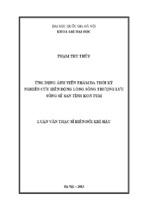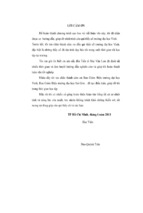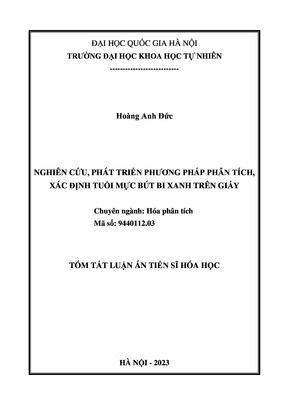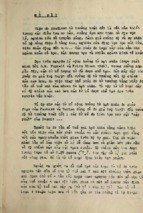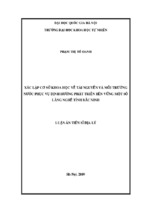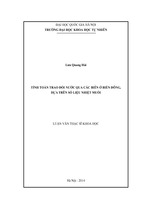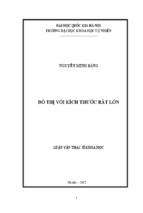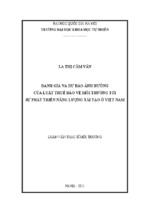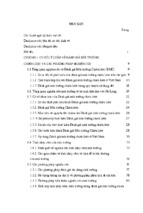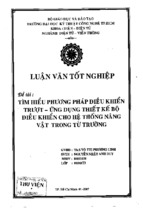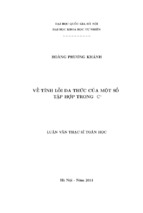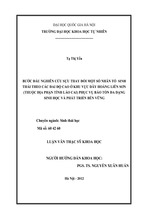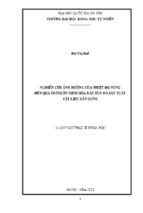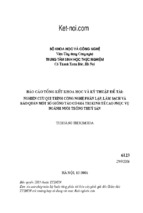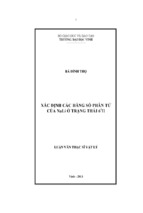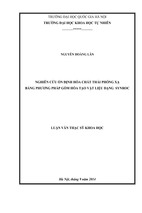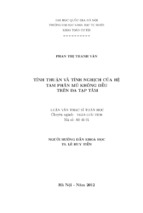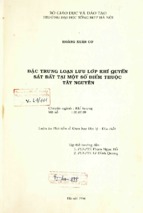THU DAU MOT UNIVERSITY
FACULTY OF FOREIGN LANGUAGES
***********
GRADUATE PAPER
TITLE: CURRENT SITUATION OF LEARNING ENGLISH IN
TOURISM FOR THE SENIOR STUDENTS AT THU DAU MOT
UNIVERSITY.
Student name: Nguyen Thanh Lam
Student code: 1722202010140
Class: D17AVKD02
Course: 2017 - 2021
Major: English Language
Lecturer: M.A, Phan Thi Phuoc
Binh Duong, November/2020
STATEMENT OF AUTHORSHIP
Student full name: Nguyễn Thanh Lam
Student ID:
1722202010140
Title of paper:
Current situation of learning English in
tourism for the senior students at Thu
Dau Mot University.
I hereby confirm that I am the sole author of the paper
presented. Where the work of others has been consulted,
this is duly acknowledged in the paper‟s bibliography. I
have also not consulted any other unnamed online sources.
All verbatim or referential use of the sources named in the
bibliography has been specifically indicated in the text.
Binh Duong, November, 2020
Nguyen Thanh Lam
ACKNOWLEDGEMENTS
First of all, I want to say thanks to my family and friends, who have
always been by my side for supporting me so much, motivating me to
complete my part in the best possible way.
Furthermore, I would like to express my deepest appreciation to all those
who provided me the possibility to complete my report at Thu Dau Mot
University. Sincere gratitude to my instructor, Mrs. Phan Thi Phuoc, who
assisted, edited, and commented on my complete report.
Finally, I want to thank people who have supported me, including
students on campus, who helped me complete the survey.
To wrap everything up, thank you so much for the many kind
relationships and cooperation during my all semester at this wonderful
school.
Sincerely,
Signature NGUYEN THANH LAM
ABSTRACT
English is a second language commonly used today in communication as
well as in the sectors of trade and tourism. In reality, thanks to English, you
can travel around the world and socialize with people everywhere. Most
vacationers would use English to communicate when traveling for comfort
and community purposes. Moreover, the tourism and travel industry is one of
the main sectors of the economy and carries important elements for the
growth of GDP. English and tourism have been integrated and incorporated
into the curriculum of English language students at universities in order to
foresee this situation. At Thu Dau Mot University, majoring students
experience the subject in their final year and are seen as a prerequisite subject.
In reality, there would be advantages and disadvantages when beginning a
new subject, contrasting perceptions and opinions when experiencing the
subject. I have done research on the status of the tourism English course for
senior business English students at Thu Dau Mot University in order to delve
into this in-depth.
The aim of the study is to understand the advantages and disadvantages
of students studying this subject, thus developing strengths and providing
solutions to overcome the challenges facing students. In addition, know the
needs that will provide sufficient recommendations when taking the issue. I
surveyed 120 final-year students for this study, majoring in business English
at Thu Dau Mot University, collected information, and analyzed it.
The study has 5 main chapters. Chapter 1: Introduction introduces
English Tourism, Statement of the problem, the purposes of the study, and
research questions. Chapter 2: Literature Review provides a theory of English
Tourism. Chapter 3: Data Collections and Analysis. Chapter 4: Discussion
and Finding. Chapter 5: Conclusion and Recommendations.
I hope that the learning and cognitive attitudes of students towards this
topic will be understood via this study, besides also providing materials for
the following studies.
Key words: English language, current situation, english of tourism,
tourism
TABLE OF CONTENTS
CHAPTER I: INTRODUCTION ............................................................ 1
1.1. Rationale for study ........................................................................ 1
1.2. Statement of problem .................................................................... 2
1.3. Research questions ........................................................................ 2
1.4. Purposes of the study .................................................................... 2
CHAPTER II: LITERATURE REVIEW ............................................. 4
2.1. History of tourism ......................................................................... 4
2.1.1 The origins of tourism ............................................................ 4
2.1.2 Definition of tourism ............................................................... 4
2.2. The origin of the English language .............................................. 5
2.2.1. Formation of E ............................................... nglish language 5
2.3. Application of English in the subject of tourism........................ 6
2.3.1. The use of English in tourism ............................................... 6
2.3.2. English tourism application to teaching .............................. 7
2.3.3. Tourism in English at Thu Dau Mot University ................. 7
2.4. Job opportunities from English tourism ..................................... 8
CHAPTER III: DATA COLLECTION AND ANALYSIS .................. 9
3.1. The survey questionnaires ............................................................ 9
3.1.1. The design of questionnaires ................................................. 9
3.1.2. Research design .................................................................... 10
3.1.3. Research methodology ......................................................... 10
3.1.4. Research location ................................................................. 10
3.1.5. Participants and sampling strategies ................................. 10
3.2. Data collection ............................................................................. 10
3.3. The data analysis ......................................................................... 11
3.3.1 Information about the person who is taking the survey .... 11
3.3.2. Students' awareness of the importance of English
communication in Tourism ........................................................... 13
3.3.3. The method of studying English Tourism for senior students
......................................................................................................... 14
3.3.4. Senior students' opinions on English Tourism maijor of
Business English. ............................................................................ 18
CHAPTER IV: DISCUSSION AND FINDINGS ............................... 21
4.1. Discussion ..................................................................................... 21
4.2. Findings ......................................................................................... 22
CHAPTER V: CONCLUSION AND RECOMMENDATIONS ....... 23
5.1. Conclusion .................................................................................... 23
5.2. Recommendations ....................................................................... 23
LIST OF TABLES
Table 3.1. Students' awareness of the importance of English communication in
Tourism...................................................................................................... 13
Table 3.2. The advantages when learning English for tourism ................... 19
Table 3.3. The difficulties when learning English for tourism .................... 19
LIST OF FIGURES
Figure 3.1. The student's school year ........................................................ 12
Figure 3.2. Major of students..................................................................... 12
Figure 3.3. The time students spend studying English for tourism
For a day .................................................................................................... 15
Figure 3.4. The time students spend studying English for tourism
for a week. .................................................................................................. 15
Figure 3.5. Students’ skills to learn English Tourism ............................... 16
Figure 3.6. How students learn English Tourism ...................................... 16
CHAPTER I : INTRODUCTION
1.1. Rationale for study:
From the dawn of humankind to around a long time ago to now,
communication, defined as a means to express or interchange sayings,
opinions, emotions, information, by writing, speaking, gesturing, and more,
has always played a vital role in people‟s lives (Nordquist, n.d.).
Communication enables humans and other species to interact with each
other and used to be processed in various forms. As time flew, ancient
people came up with an idea of word formulation, which is composed of
vowels and consonants. That the form of oral tradition was born was the
result of it. Language, a system of traditional spoken, manual (signed) or
written symbols allows human beings, as members of a social group and
participants in their society to express themselves and communicate with
people possessing the ability to use the same language (Crystal, 2020).
Through many centuries, manifold events that happened concerning war,
territorial divisions, diversity in races, and development of livings gave birth
to nations. Each nation has its own language. The development of a nation
will go hand in hand with the widespread recognition of its language. The
long-standing advancement and the rise of Western countries accelerated
English to become the most popular language and a mandatory subject at
schools in some countries. British Study Centers (2020) have mentioned ten
reasons to learn English, explained by the term of a global language, the tool
for facilitating the job-hunting process, more meetings with different people,
comprehension in reading and researching topics mostly written in English,
the language of the media industry and the Internet, the expansion in
business, easier access to travel, study, and multiple cultures. For the
aforementioned clues, more attention should be paid to learning English.
In addition, nowadays, The travel and tourism industry is one of the
largest manufacturing sectors in the world on the grounds that it stimulates
economic growth, generates jobs, increases social development, and
promotes peace, by its sector, hundreds of millions of people around the
world rely on for their jobs. The travel and tourism industry is a vast sector
made up of millions of companies and employees, from the largest global
travel brands to the smallest tour operator or hostel owner. Together, we are
forming a powerful force with a presence to be heard at the highest levels of
society and government (Sofronov, 2018). Referring to how big travel and
tourism are, there always exists an increasing number of people in general
and students, in particular, wishing to learn and involve in the travel field for
better achievements. Nonetheless, advantages always come with
arduousness. To be an expert in the travel field requires learners to spend
more time practicing and experiencing real situations and devote their time
to discovering those cultural features of places. Also, it is never regarded as
an unchallenging road to learn and use the language effortlessly. Therefore,
learners have to actively study and immerse themselves in it, particularly,
English. For more progress in career, students at university have a tendency
to choose to study English Business, in which English for tourism is an
indispensable part of its curriculum.
1.2. Statement of problem:
The problem shows how to learn and apply current learning methods of
senior students majoring in business English in English language major.
From the survey, it shows the advantages and disadvantages of learning the
subject and the student's desire for the subject.
1.3. Research questions
This study intended to answer the following questions:
- What are the student's perception of the importance of English for
tourism?
- What are the difficulties and advantages when learning English for
tourism students?
1.4. Purposes of the study
First and foremost, the aim of the study is to make the students aware of
the significance of the subject when added to the curriculum. Next, when
introduced to the subject, the advantages and drawbacks are established,
thereby identifying the needs of students for this subject. The last is to
provide some ideas for improvement on the downside and build strengths
when studying this subject.
English is a second language widely used in communication today as
well as used in the commerce and tourism industries. In fact, you can travel
around the world and socialize with people everywhere thanks to English.
Most vacationers will use English to communicate while traveling for
convenience and community. The demand for tourism is increasing,
communication and understanding of cultures of the countries are also
increasing, so learning English to exchange information while traveling has
also increased. Therefore, knowing English while traveling is an advantage
to be able to push yourself forward and have the best experience.
At Thu Dau Mot University, English language students are divided into
teaching and business English majors. In the Business major, students are
exposed to English for tourism. Everyone thinks that learning English for
tourism is only for when it is necessary to travel, but in reality, not everyone
studying English for business and tourism can make travel immediately, but
that learning will work as a necessary tool for everyone to prepare for the
best experience.
That is the reason, I decided to do a study called "Current situation of
learning English in tourism of the senior students at Thu Dau Mot
University."
CHAPTER 2: LITERATURE REVIEW
2.1. History of tourism
2.1.1. The origins of tourism
Today, tourism is one of the key economic sectors of our country and its
influence is increasing. Therefore, the history of the tourism industry is
increasingly interesting and explored. The period of tourism is from the late
18th century and develops to the 21st century but the period begins a long
time. In the Western tradition, organized travel with supporting
infrastructure, sightseeing, and an emphasis on essential destinations and
experiences can be found in ancient Greece and Rome, which can lay claim
to the origins of both “heritage tourism” (intent at the celebration and
appreciation of historic sites of recognized cultural importance) and beach
resorts (John K. Walton, 2020). During the years that travel goes through,
tourism gradually asserts its position. Travel offers meaningful rides and
gets experience. By the early 19th century, European journeys for health,
leisure, and culture became common practice among the middle classes, and
paths to the acquisition of cultural capital (that array of knowledge,
experience, and polish that was necessary to mix in polite society) were
smoothed by guidebooks, primers, the development of art and souvenir
markets, and carefully calibrated transport and accommodation systems.
(John K. Walton, 2020).
2.1.2 Definition of Tourism
According to Wikipedia, Tourism is travel for pleasure or business, also
the theory and practice of touring, the business of attracting,
accommodating, and entertaining tourists, and the business of operating
tours. According to Smith (1988), an author of a specialist dictionary on
tourism, the word „tourist‟ was introduced in 1800, and the word „tourism‟
in 1811. However, what exactly is no definition of either term has become
extensively recognized regardless of the fact that both terms have now been
part of the English language for over two centuries. As indicated by Smith
(1988), he suggests that there “probably never will be a single definition of
tourism” or tourists as economists, psychologists and geographers perceive
different things about tourism in their own professional field (Smith 1988 as
cited in Leiper).
Though many of us have been “tourists” at some point in our lives,
defining what tourism actually is can be difficult. Tourism is the activities of
people traveling to and staying in places outside their usual environment for
leisure, business, or other purposes for not more than one consecutive year.
Tourism is a dynamic and competitive industry that requires the ability to
adapt constantly to customers‟ changing needs and desires, as the customer‟s
satisfaction, safety, and enjoyment are particularly the focus of tourism
businesses. When it comes to the definition of "tourism" we refer to the
movement of tourists. Besides, some people use it to refer to abstract
concepts, covering people, places, and components. Lieper (1979), who has
reviewed many of these definitions, suggests that the descriptions can be
classified based on their manifest content into three categories: "economic,"
"technical," and "holistic." As informative as Liepcr's review is, he does not
emphasize the fact that "tourism" has so many definitions because there are
so many uses for definitions. His goal--a single, comprehensive, and widely.
2.2. The origin of the English language
2.2.1. Formation of English language
English history is traditional, if maybe too tidy, divided into three
ages, generally called Old English (or Anglo-Saxon), Middle English, and
Modern English. English is part of the Indo-European language family and
is thus related to the majority of other languages spoken from Iceland to
India in Europe and Western Asia. (Merriam-Webster, 2020)
English belongs to the Indo-European family of languages and is
therefore related to most other languages spoken in Europe and western
Asia from Iceland to India. Approximately 5,000 years ago, the parent
language, dubbed Proto-Indo-European, was spoken by nomads thought to
have roamed the southeast European plains. Germanic, one of the language
groups descended from this ancestral expression, is generally divided into
three geographical groups by scholars: East (BurgunVandal, and Gothic, all
extinct), North (Icelandic, Faroese, Norwegian, Swedish, and Danish), and
West (Norwegian, Swedish, and Danish) (German, Dutch [and Flemish],
Frisian, and English) (Potter and Crystal, 2020). Indian,
2.3. Application of English in the subject of tourism
2.3.1. The use of English in tourism
We most frequently hear words such as Civil Engineering English,
Computing English, Music English, Medicine English, Business English and
so on. English for tourism and hospitality is used for international tourism
and service sectors, which are considered for particular purposes within the
English category and its practical implementation must be understood. In
many different fields such as education, business, technology, media,
science, tourism, and medicine, English has dominated (Zahedpisheh, N.,
Bakar, Z.A., & Saffari, N. (2017))
According to a survey and results of Needs Analysis on English
Language Use in the Tourism Industry, the application of English in tourism
is increasingly popular. The results showed that in this study, the majority of
tourism employees classified all four abilities to listen, read, write, and talk
as highly required. This can be explained by the fact that there are many
foreigners visiting Thailand since the tourism industry has been promoted
for many years, and as a result of this, tourism employees have had a great
opportunity to use English when guiding foreign tourists to visit the tourist
attractions, festivals, and events throughout Thailand. It can also be said that
they prefer to use English more in order to interact with foreigners
(Prachanant, N. (2012)). In the context of the tourism industry, English is the
most widely spoken foreign language in Europe and around the world, as it
has already been developed. (Cooper, C., & Latham, J. (1988)). Many
scientists have analyzed and produced many different findings. In any field
of research, tourism, the growth of transdisciplinarity often implies an
acceleration of progress towards mode 2 knowledge: a new form of
knowledge involving a variety of mechanisms for creating/knowledge
exchange, participants from various disciplinary backgrounds, and a wide
variety of places where knowledge is produced. (Fox, R. (2008)).
2.3.2. English tourism application to teaching
When tourism and English become increasingly popular, it is
increasingly important for teachers to bring them into teaching education,
requiring teachers and learners to connect with them in the right way. For
learners in the most attentive way. To acquire information, students have had
tours and extracurricular experiences from primary and high school and will
eventually shape the idea of traveling and learning the knowledge in the
mind of the child. Educational visits are an important source of custom for a
range of attractions - many rely on educational parties for up to 10% of their
total visits. There are sound economic reasons for attracting educational
groups as they often visit during the week or out of the peak season and
provide a much-needed contribution to fixed costs at a time when there may
otherwise be few visitors. (Raţă, G., Petroman, C., & Petroman, I. (2013)).
2.3.3. Tourism in English at Thu Dau Mot University
It is evident today that in the time of national industrialization and
modernization, the tourism service industry has an attraction and a
significant role to play. There are many tourists who come to Vietnam and
often want to explore this country, so it is important to interact to be able to
impart Vietnam's culture to tourists and learn more about your country's
culture. When asked about the relevance of this topic, the majority replied
that the topic is relevant in the major and gained support when the topic for
final year students was added to the major.
In a positive direction, being exposed to English for tourism in the
university environment as a subject will help students a lot. Today, it is
undeniable that the tourism service industry has an attraction to and plays an
important role in the period of national industrialization and modernization.
There are many tourists going to Vietnam and always want to explore this
country so communication is always the fastest way to reach tourists. Adopt
English as a second language. Besides, when doing jobs related to tourism,
we really need English to communicate, so we can mention the following
benefits.
First, you will easily make friends and express yourself. It's easier than
ever to express and express your thoughts, wherever you go. Asking and
explaining what you want will be simpler. For example, if there is a problem
at the airport, you can easily clarify everything. At the hotel, you can order
food and order the services you want. English helps you get what you want
and deliver the best value for your money.
When you can speak English as a common language, it is easier for you
to meet interesting people and build new relationships, and from there, learn
a lot from their lifestyle.
Next, Knowing English gives you more confidence: When you know
that you can easily express your thoughts and even make new friends, your
confidence will drastically improve during the trip. Since you can hear what
people are saying, and can even ask questions when needed, you can keep
yourself safe by avoiding dangerous places. You will learn more abroad
when you speak English because When you learn English, it is easier to
understand that local culture.
2.4. Job opportunities from English tourism
Job opportunities when learning English for tourism are always open to
students, especially students in business English. It will be an advantage
when students have appropriate learning methods and know-how to catch
internship opportunities in different large and small companies. We can refer
to job opportunities such as receptionists, office workers in big hotels or
resorts, tour guides in English; Assistant to department heads in hotels,
Assistant to the director; Marketing staff for tourism projects; Staff
specializing in customer care services, sales staff, tour operators in travel
agencies; Ticketing, booking, receptionists in travel agencies, hotels, and
businesses speak English.
CHAPTER III: DATA COLLECTION AND ANALYSIS
3.1. The survey questionnaires.
3.1.1. The design of questionnaires.
The students' questionnaire is a fourteen-item questionnaire divided
into three sections. The questionnaire will concentrate on the most objective
questions to fit the subject of the study. Part one included three questions
that provide information about the survey subjects to make sure that the
survey subjects are final-year students majoring in business English at Thu
Dau University. In part two will show senior students 'perceptions of
Business English majors on the importance of Tourism English denoted in
question 3,4,5. In part three, is the method of studying English Tourism for
final year students, including the time to study and how to use the skills to
the subject (questions 6,7,8,&9). And the last part of the survey that senior
students' opinions on English Tourism major Business English to collect
more ideas on what to expect from the subject (question from 10 to 12).
This questionnaire was designed to exploit the information in the following
aspects:
Question 1: To know the student's school year
Question 2: To know the major of the students
Question 3: Students' awareness of the importance of English
communication in tourism
Question 4: Students' awareness of the importance of English for
tourism
Question 5: Know the importance of English for tourism in career
opportunities
Question 6&7: To know the time that students spend in English tourism
at home.
Question 8: Know the skills that students use when learning English for
tourism
Question 9: To know supporting tools when students learn English of
Tourism
Question 10: To see some advantages of learning English for Tourism
Question 11: To find out some difficulties when learning English for
tourism
Question 12: To collect more ideas on what to expect from the subject.
3.1.2. Research design
To conduct this research, I decided to choose primary research, defined
as a methodology to collect data straightly, in lieu of using data amassed
from formerly conducted research. Therefore, there will be no unconvincing
data. In addition, with this type of research, researchers can give entire
attention to the matter and go deeply into the research. Further and more
importantly, this type also enables researchers to control the data and
determine how the data will be used and collected for better insights. For the
above fortes, it will be the most effective to use primary research.
3.1.3. Research methodology
I used a quantitative method since this method helps the researcher to
collect and analyze numerical data which can be mathematically computed.
3.1.4. Research location
For a quantitative method, it is conducted online due to the fact that the
Covid-19 pandemic is dangerous to everyone. As a result, doing survey at a
particular location will come with some difficulties for me and I will find it
arduous to implement getting information process.
3.1.5. Participants and sampling strategies
As for online surveys, I resorted to the purposive sampling strategy as
this type of sampling lets the researcher utilize their judgment to pick
participants having the most useful contributions to the purpose of the
research. For that reason, I have chosen this sample to approach 120 target
participants, who are members of every English Business class group in Thu
Dau Mot University.
3.2 Data collection
For quantitative method, it will be carried out by using an online
survey, particularly with the means of Google Form tools. The survey will
be designed with a well-structured questionnaire under the guidance of the
author. The questionnaire will comprise 12 closed questions with multiple
choices. To complete the questionnaire, they have to choose their answers by
ticking. The survey is conducted online, so the respondents must have
mobile devices, laptops, or computers with an Internet connection. The
researcher will post it on English Business classes to call for participants.
The advantage of this survey goes with the quickness. It only takes
participants almost 3-5 minutes for all of them to complete the survey, so the
number of participants who ungrudgingly fulfill it will be huge. Moreover,
running it online will lower the cost for the researcher during the
implementation process.
3.3. The data analysis
With the permission of the teacher, the online survey was sent to the
student groups each other class group, this is a time-consuming and
convenient way of survey during the covid-19 season to ensure safe contact.
Quantitative data will be analyzed with the means of application of statistical
software, which is Google Form. The form will be closed on. After the data
have been collected, Google Form will demonstrate the data as charts or
tables so that the researcher can examine the relationships and trends in the
data. Also, the researcher can apply Descriptive Statistics to summarize the
data and find the features. The percentage is commonly used in Descriptive
Statistics to express how a group of respondents within a data pertains to a
larger group of respondents. For instance, age and gender distribution will be
best shown in percentage.
3.3.1 Information about the person who is taking the survey
The figure 3.3.1 and figure 3.3.2 in part 1 of the survey shows that the
120 students surveyed are senior students majoring in English at Thu Dau
Mot University and all students are involved in English Business Major.
This shows that the respondents met the needs and scope of the survey.
Therefore, the survey will produce the most objective results possible.
0%
100%
Freshman
Sophomore
Junior
Senior
Figure 3.1. The student's school year
0%
100%
English Teaching
English Business
Figure 3.2. Maijor of students
3.3.2. Students' awareness of the importance of English communication in
tourism
In this table, respondents had to tick on the boxes that describe their
opinion.
The level of important would be presented by number from one to five
(1)Not
important,
(2)
Less
(4)Important, (5)Very important
important,
Question
(3)So
important,
Level
1
2
3
4
5
3. Do you think English is the 3%
important
language
to
communicate when traveling?
12%
20%
31%
34%
4. Do you realize that learning 3%
English
for
tourism
is
important or not?
5%
10%
26%
56%
5. Do you think the subject 2%
would have high job prospects?
4%
15%
12%
67%
Table 3.1. Students' awareness of the importance of English communication in
tourism
- Xem thêm -


